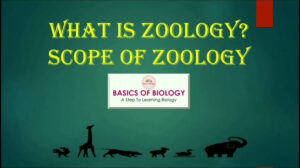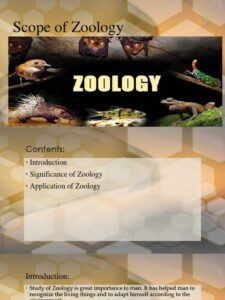Back to: ZOOLOGY 100 Level
Hello my dear friend! Welcome to class today—how you dey? I hope you’re sitting comfortably with a chilled bottle of water or zobo by your side, because today’s gist na one wey go carry you waka into the amazing world of animals. You’re about to begin a journey that could turn you into the next big name in animal science. So, make yourself comfortable, and let’s go on this adventure together—just you and me.
Definition and scope of zoology
Now, think about this for a second—every morning, you wake up to the sound of birds chirping, maybe goats bleating in the backyard, or you watch ants forming a straight line carrying crumbs ten times their size. Have you ever wondered why they behave the way they do? Or why some animals only come out at night? This is the heart of zoology—the science of animals.

Zoology is not just about looking at animals in the zoo or hearing about lions and elephants on TV. It is a full study, like how a mechanic studies cars, but this time, you’re studying living creatures with heartbeat, brain, and behaviour. Whether it’s a tiny mosquito or a giant whale, zoology helps us understand them all.
Zoology is the branch of biology that focuses on animals—their structure, function, evolution, classification, habits, and interaction with their environment. The word “zoology” comes from two Greek words: zōon meaning “animal” and logos meaning “study.” So literally, it means “the study of animals.”
Now, when we say “animals”, we’re talking about every living creature that’s not a plant, fungus, or bacteria. From the common cockroach in your kitchen to the python in the forest, zoology is interested in all of them.
The scope of zoology is very wide. It includes many branches such as:
- Anatomy – studying the internal body parts of animals.
- Physiology – how their body systems function, like breathing, digestion, and reproduction.
- Ecology – how animals interact with each other and with their environment (e.g., why fish survive in water but not on land).
- Genetics – understanding how traits are passed from one generation to another, like why goats give birth to goats and not chickens.
- Entomology – the study of insects (yes, even the mosquito that disturbs your sleep has a full PhD-level science behind it).
- Ethology – studying animal behaviour. For example, why do dogs wag their tail when they’re happy?
Zoologists play a big role in real life—they help in medicine, agriculture, wildlife conservation, and even controlling diseases (like how understanding mosquitoes helps fight malaria). In Nigeria, we have zoologists working with environmental agencies, universities, and even NGOs helping protect endangered species like the Cross River gorilla.

Let’s make it real. Imagine you’re from Enugu and you grew up seeing lizards everywhere. You noticed some of them nod their head while others puff their throat. That’s animal behaviour—ethology. If you decided to cut one open (with proper training, of course), to check what’s inside, you’re doing anatomy. If you are curious about why it can survive in hot weather and stay motionless on the wall all day, that’s ecology and physiology right there. All of these fall under zoology.
Summary
Zoology is the scientific study of animals. It covers everything about animals—how they look, how they behave, how they survive, how they evolve, and how they interact with their surroundings. The field includes several branches like anatomy, physiology, ecology, genetics, entomology, and ethology. It plays an important role in medicine, agriculture, conservation, and health, especially here in Africa.
Evaluation
- In your own words, what is zoology?
- Mention three branches of zoology and briefly explain each.
- Think about any animal in your area. Describe one thing it does and link it to a branch of zoology.
Well done champ! You’ve taken your first step into the wonderful world of zoology—and I couldn’t be prouder of you. Always remember: knowledge is power, and with Afrilearn by your side, you’re on your way to becoming a top-notch African zoologist. See you in the next lesson, and till then, keep observing the world around you. There’s so much to learn!
